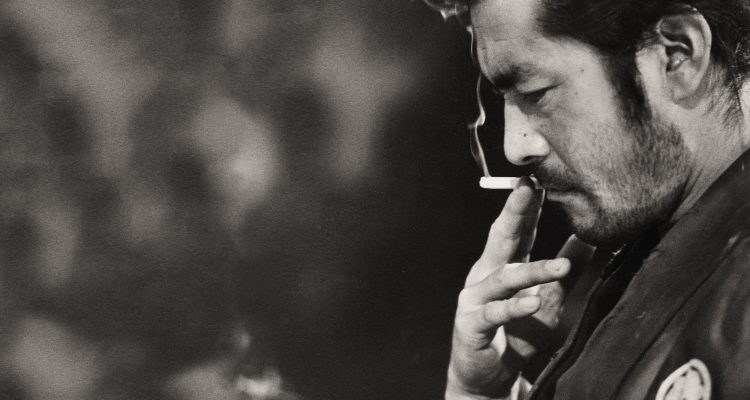It’s hard to talk about Toshiro Mifune without mentioning Akira Kurosawa. And it’s hard to talk about Mifune and Kurosawa without discussing their revelatory impact on cinema as we know it today. Which, in a way, is exactly what “Mifune: The Last Samurai,” the new documentary from Steven Okazaki, seeks to explore: just who was Toshiro Mifune and how did a boy from such humble beginnings wind up becoming one of film’s most influential figures? And while ‘Mifune’ might fall short of becoming anything profound, it is nonetheless, an engaging, informative look at the life of a legend.
Toshiro Mifune was born during the early days of Japanese cinema and grew up frequently going to the movies. Never, though, did he have the desire to be an actor. Instead, Mifune, who was born in China to Japanese parents, was enlisted in the army when he was just 20. War followed. Still only a young man, Mifune was responsible for the harrowing task of training young recruits for suicide missions. After Japan’s defeat, Mifune, like most all of his fellow countrymen, was out of a job. To make ends meet he applied for a position as an assistant cameraman at Toho Studios. Instead, his severe, utterly devastating looks earned him an unwanted job as an actor. And at first, that he didn’t want to act was irrelevant, as he needed the money. Soon, though, Mifune was giving himself entirely to the craft, helping to redefine what it meant to perform.
 That stardom was more or less placed upon Mifune without his consent, is unsurprising. It’s hard to imagine such raw, unbridled energy seeking out the spotlight. Mifune, in many ways, had the manner of a wounded beast. He walked with such assurance, with the propensity for violence, and his stoic face, fluttered from rage to glee to placidity in a matter of beats. Kurosawa recognized Mifune for what he was — a once in a generation talent — and began casting him right away. Their collaboration, 16 films in all (including “Rashoman,” “Seven Samurai,” “Throne Of Blood,” and “Yojimbo”), would lead to their best work and change cinema forever.
That stardom was more or less placed upon Mifune without his consent, is unsurprising. It’s hard to imagine such raw, unbridled energy seeking out the spotlight. Mifune, in many ways, had the manner of a wounded beast. He walked with such assurance, with the propensity for violence, and his stoic face, fluttered from rage to glee to placidity in a matter of beats. Kurosawa recognized Mifune for what he was — a once in a generation talent — and began casting him right away. Their collaboration, 16 films in all (including “Rashoman,” “Seven Samurai,” “Throne Of Blood,” and “Yojimbo”), would lead to their best work and change cinema forever.
To tell Mifune’s story, Okazaki brings together the actor’s eldest son, his longtime fight coordinator, and the actors and actresses he worked alongside — a veritable who’s who of Japanese cinema (not to mention the likes of Martin Scorsese and Steven Spielberg). Together, with narration from Keanu Reeves, a compelling portrait is drawn of a reluctant idol who nonetheless came to embrace and depend on his fame: an endlessly benevolent co-star, a tireless worker, a drunk, a man of principle and sorrow and joy. But like so many films that seek to pay homage to the late-greats of cinematic lore, ‘Mifune’ cruises through the actor’s lows. His failed marriage, his drinking problem, and his final years as a star that had more or less burned out, are all touched on in a cursory fashion, given the requisite mention, and swept back under the rug to get onto greater glories.
 It’s not necessarily a failing of the film, but it does suck out some of the potential for ‘Mifune’ to turn into something more than a straightforward biography — which, it must be noted, it never completely succumbs to either. Throughout, it’s hard not to get whisked away by the reverence with which everyone talks about Mifune, both those who knew him as a man and those who know him only on the screen. It’s also fascinating to see just how much control Kurosawa ceded to Mifune when they worked together, just how much Mifune’s greatest characters came from some deep, hidden well inside of him.
It’s not necessarily a failing of the film, but it does suck out some of the potential for ‘Mifune’ to turn into something more than a straightforward biography — which, it must be noted, it never completely succumbs to either. Throughout, it’s hard not to get whisked away by the reverence with which everyone talks about Mifune, both those who knew him as a man and those who know him only on the screen. It’s also fascinating to see just how much control Kurosawa ceded to Mifune when they worked together, just how much Mifune’s greatest characters came from some deep, hidden well inside of him.
Essentially, “Mifune: The Last Samurai” is a film about a cinematic legend that will likely connect best with those already familiar with Toshiro Mifune. Okazaki’s doc is an effortless, dutifully drawn picture, but it never becomes much more than a birth-to-death story. When it does — mostly in the moments where Shiro Mifune’s tragic stories of his haunted father are juxtaposed with some of Mifune’s most memorable scenes — the film knows to linger. For all the coiled, unbridled rage, for all the humor and energy that Mifune’s characters carried, there was always a sadness too, a reservation and introspection, and while the film captures Mifune’s, it never finds its own. [B]

